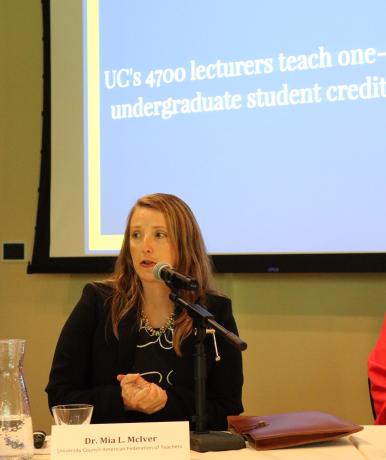Mia McIver Testimony at Select Committee Hearing on Master Plan for Higher Education
May 4th, 2018
Chair Berman and Members of the Committee:
Thank you for the opportunity to address you. I received my Ph.D. from UC Irvine, meaning the
State of California invested in me as a scholar and a teacher. It is an honor to repay that trust and
help guide California’s public higher education forward into the future.
I am currently a contingent faculty member at UCLA and President of University Council-
American Federation of Teachers, the labor union representing University of California lecturers
and librarians. I speak today on behalf of non-tenure-track faculty who are integral to the UC’s
tripartite mission of research, education, and service.
The 1960 Master Plan never envisioned the widespread exploitation of underpaid,
underemployed faculty. Yet that is the situation at the UC today. UC’s 4700 lecturers teach
one-third of undergraduate student credit hours.1 All together, precarious instructors (including
adjuncts, visiting assistant professors, academic student employees, and others) teach nearly onehalf
of undergraduate credit hours. Faculty growth is occurring mainly in contingent job titles.2
The UC uses temporary faculty to do permanent work, a short-sighted policy that short-changes
California’s students. Although there are 54% more students at the UC today than in 2000,3
clearly indicating a long-term need for high-quality instruction, excellent lecturers are treated as
disposable and subject to forced turnover, often prevented from teaching longer than a year or
two.
Like many of my colleagues, I work multiple jobs to make ends meet and struggle to remain in
the middle class. Artificially-depressed appointment percentages unnecessarily exclude lecturers
from basic health and retirement benefits. And we perform countless hours of uncompensated
research and service. Our working conditions incur profound feelings of isolation, anxiety, and
depression. By neglecting a corps of incredibly qualified, talented, experienced, and
accomplished faculty, the UC diminishes these dedicated public servants who are so well prepared
to mentor students.
UC Office of the President administrators publicly describe contingent faculty as subsidizing
tenure-track faculty by teaching their classes for them. This two-tier model, in which teaching is
effectively outsourced, drives a wedge between faculty and creates clear conflicts of interest.
This is not only a matter of equity within a faculty hierarchy, but also of racial and gender equity.
Lecturers are more likely than tenure-track faculty to be women and people of color.4
UC campuses intensify this stratification by separating research and teaching into distinct silos.
Whereas the Master Plan originally emphasized the importance of scholar-teachers, UC
administrators are increasingly segregating pedagogy from scholarship. This does a clear
disservice both to students, who benefit from studying with experts in their chosen fields, and to
faculty, whose research benefits from engaging student perspectives.
In considering the future of the Master Plan, the Legislature should:
• Restore state funding to historically high levels and dedicate a stable funding source to all
three segments of public higher education. The Reclaim California Higher Education
Coalition has proposed one such policy, The $66 Fix. California’s students deserve to
graduate from college debt-free. Stable and dedicated funding will also relieve the UC
from the budgetary uncertainty that produces faculty precarity and undermines student
success.
• Reform the Board of Regents to ensure its members better reflect California’s residents
and UC stakeholders, promote educational instead of corporate governance, and include a
seat for a contingent faculty member.
• Include measures of contingent faculty welfare in accountability metrics for the UC and
set ambitious targets for the UC to meet. The most revealing statistics to analyze would
be lecturer turnover rate and average appointment percentage.
• Advocate for contingent faculty professional development and inclusion in academic
initiatives.
While taking care not to infringe on the autonomy of the UC, the Legislature should urge the
Regents to:
• Stop forced turnover by instituting rehiring rights for early-career contingent faculty.
After taking one of my classes, my students often ask whether they can take another with
me. I have to respond that I don’t know whether I’ll be teaching next year. We can only
invest in our students to the extent that the University invests in us.
• Improve quality of instruction by replacing Student Evaluations of Teaching with a peer review
model of teaching evaluation. Students deserve to have a voice in their own
education, but research demonstrates that using SET in personnel decisions perpetuates
racism and sexism, compromises academic freedom, and generates a customer service
dynamic that undermines sound pedagogy.
• Establish pay parity among tenure-track and non-tenure-track faculty.
• Enfranchise lecturers and adjuncts through membership in the UC Academic Senate. We
have tremendous responsibility for educating students but little to no voice in decision making
about curricula and other matters. There is no justifiable reason to exclude such
an enormous number of faculty from shared governance.
My students make me fiercely proud when they graduate with the ability to inquire, to challenge,
and to create. The UC makes me fiercely proud when it empowers members of our community
within and beyond the University. By inviting contingent faculty to this hearing, you have
already signaled that you share this pride, as well as a holistic vision for research, teaching, and
service at the UC. I am grateful for the opportunity to speak today, for your commitment to
public higher education, and for your leadership in reframing the Master Plan for the twenty-first
century.
Mia L. McIver, Ph.D.
Lecturer, UCLA Writing Programs
President, University Council-American Federation of Teachers
1 2017 UC Accountability Report, p. 127
2 https://www.universityofcalifornia.edu/infocenter/uc-employee-headcount
3 https://www.universityofcalifornia.edu/infocenter/fall-enrollment-glance
4 https://www.universityofcalifornia.edu/infocenter/uc-workforce-diversity

- Log in to post comments

